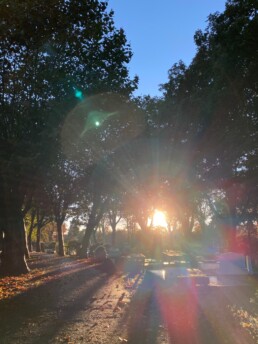Reclaiming Your Self-Worth: You Are as Beautiful as a Sunrise
Why Do You Feel You’re Not Worth It?
How often do you do something just for you?
Take yourself out for ice cream?
Book a massage?
Sit down with a journal or a hot tea and tend to your inner world?
Self-investment is an act of self-worth.
It tells you: I matter. I’m worth caring for.
But what if you’re not there yet?
What if you feel undeserving of rest, joy, or kindness?
And deep down, you feel you’re not “enough” to receive any of it?
The excuses show up:
“I’m too busy.”
“My kids need me.”
“My relationship is demanding.”
“I’m exhausted.”
The list goes on.
But have you looked yourself in the mirror—truly looked—and asked why you’re putting yourself last?
How to rebuild self-worth and overcome inner criticism
What’s Blocking You From Seeing Your Worth?
That inner belief—that you are not enough—didn’t come from nowhere.
It may have started in childhood:
A punishing parent. Emotional neglect. Verbal abuse.
Moments that made you feel like your needs were too much, your voice too loud, your softness too weak.
Unhealed trauma creates stories we carry for decades.
Stories that whisper: You’re not worth it.
Not worth care.
or the love.
Not even your own kindness.
But none of that is true.
How Do You Start Loving Yourself Again?
Start small.
Whisper something kind to yourself in the mirror.
Say it out loud if you can.
Look into your own eyes and say:
“I’m worthy of care.”
“I’m still here. And that matters.”
Remember your resilience.
And the joy you’ve given others.
Remember the steps you’ve taken to reach where you are.
You Deserve to Be Taken Care Of—By You
You shine—just like a sunrise.
Every single morning.
Whether you see it or not.
And like the sunrise, your beauty doesn’t depend on someone else noticing it.
It’s just there.
Unfolding. Quiet. Undeniable.
How to rebuild self-worth and overcome inner criticism
Other reads:
More about my offerings on this link.
About mindfulness on this link.
Learn more about healing your inner child on this link.
External Resources:
Zen & Engaged Buddhism:
Clinging and the art of letting go
How Many Times Have You Had to Let Go?
Think of the moments you’ve had to let go—voluntarily or not.
A person. A pet. A job. A dream. A version of yourself.
Loss is part of life, and yet, letting go never seems to get easier.
Take a moment: can you recall your most recent experience of loss?
What did it feel like?
Whether it’s a breakup, the passing of a loved one, a shift in career, or something as small as a childhood pet—you may notice a pattern in how you deal with it.
A Lesson from a Small Loss
Recently, my niece lost her hamster. For her, this was the first tangible experience of loss within her household.
She has a few choices:
-
She can cling to the memory and wish it never happened
-
She can mourn, accept the loss, and move forward
-
Or she can suppress her feelings and pretend the hamster never existed
And that third option? It’s the most dangerous. Because what’s suppressed doesn’t disappear. It resurfaces—often disguised as something else, in moments we least expect.
As Adults, We Do the Same
Clinging isn’t just about pets or relationships.
It’s about the emotional patterns beneath them.
-
Maybe you cling to people because you fear abandonment
-
Or hold tightly to a job title because it validates your worth
-
You might rush to replace loss because you can’t tolerate emptiness
The cling itself is not the problem. It’s a symptom.
What’s underneath?
A Few Questions to Ask Yourself
-
What am I clinging to right now?
-
What deeper wound might be fueling this attachment?
-
Am I looking outward for something I need to cultivate within?
-
What memory or emotion needs my attention and compassion?
Letting Go Is Not Abandonment—It’s a Return
When you begin to recognize your attachments with curiosity—not shame—you begin the process of release.
Letting go doesn’t mean you stop loving or caring.
It means you stop outsourcing your wholeness.
You return home to yourself.
And from there, you realize:
You are enough.
You are worthy of joy.
And capable of holding yourself through loss—and still choosing love.
Other Reads
More about my offerings on this link.
About mindfulness on this link.
Learn more about healing your inner child on this link.
External Resources:
Zen & Engaged Buddhism:
The Everlasting Seeking Syndrome: When the Search Becomes the Struggle
The everlasting personal development seeking syndrome?
This is a personal reflection—part observation, part opinion, part lived experience. Take it gently. Not too seriously. It’s about: Personal development and the trap of constant seeking
When I began my personal development journey six years ago, I was like freshly kneaded dough—soft, open, easily shaped.
I met many practitioners who had already lined up their calendars with trainings, retreats, and workshops. At first, I was inspired. But then, something started to bother me.
It was a question that kept returning:
“Is this what personal development means?”
“Am I meant to be constantly searching for someone else to show me the way?”
I noticed something beneath the surface—a restlessness. A constant reaching.
People were always looking for the next thing that might fix their relationships, their traumas, their families, their inner wounds.
The topic didn’t matter. The approach didn’t change.
The hunger to be fixed was endless.
Looking Inward, Not Just Outward
It took me time to realize that always seeking solutions “out there” often means we’re avoiding what’s already within.
Have you ever stopped to look inward—truly?
Placed a hand on your belly, your chest, and simply listened?
Because yes, teachings can guide.
Yes, mentors can help.
But wisdom? Wisdom is not given.
It is remembered.
What Happens When We Depend on Others for Our Growth?
When you rely constantly on others to show you the way, you might forget that you already have the map. You just haven’t looked at it in a while.
You already hold the intuition, the experience, the insight to face your path.
When you trust that inner compass, external tools become support—not crutches.
The process of accessing your wisdom can be taught.
But wisdom itself? It is not transferrable.
It lives within you.
Why It Matters
When you live in constant search mode, you become an “everlasting seeker.”
You collect tools but never use them.
You gather teachings but never integrate them.
And stay busy—but disconnected.
This seeking can be a coping mechanism. A way to avoid sitting with the discomfort of what’s already known but not yet healed.
Nature Has Its Own Wisdom
A calf stops feeding on its mother’s milk when it’s ready to find nourishment on its own. It doesn’t reject guidance—it outgrows it. That’s evolution. That’s trust.
The same is true for us.
Let your learning nourish you.
But remember: you are not incomplete.
You are not broken.
You don’t need to chase forever to become whole.
Personal development and the trap of constant seeking
Other Reads
More about my offerings on this link.
About mindfulness on this link.
Learn more about healing your inner child on this link.
External Resources:
Zen & Engaged Buddhism:


